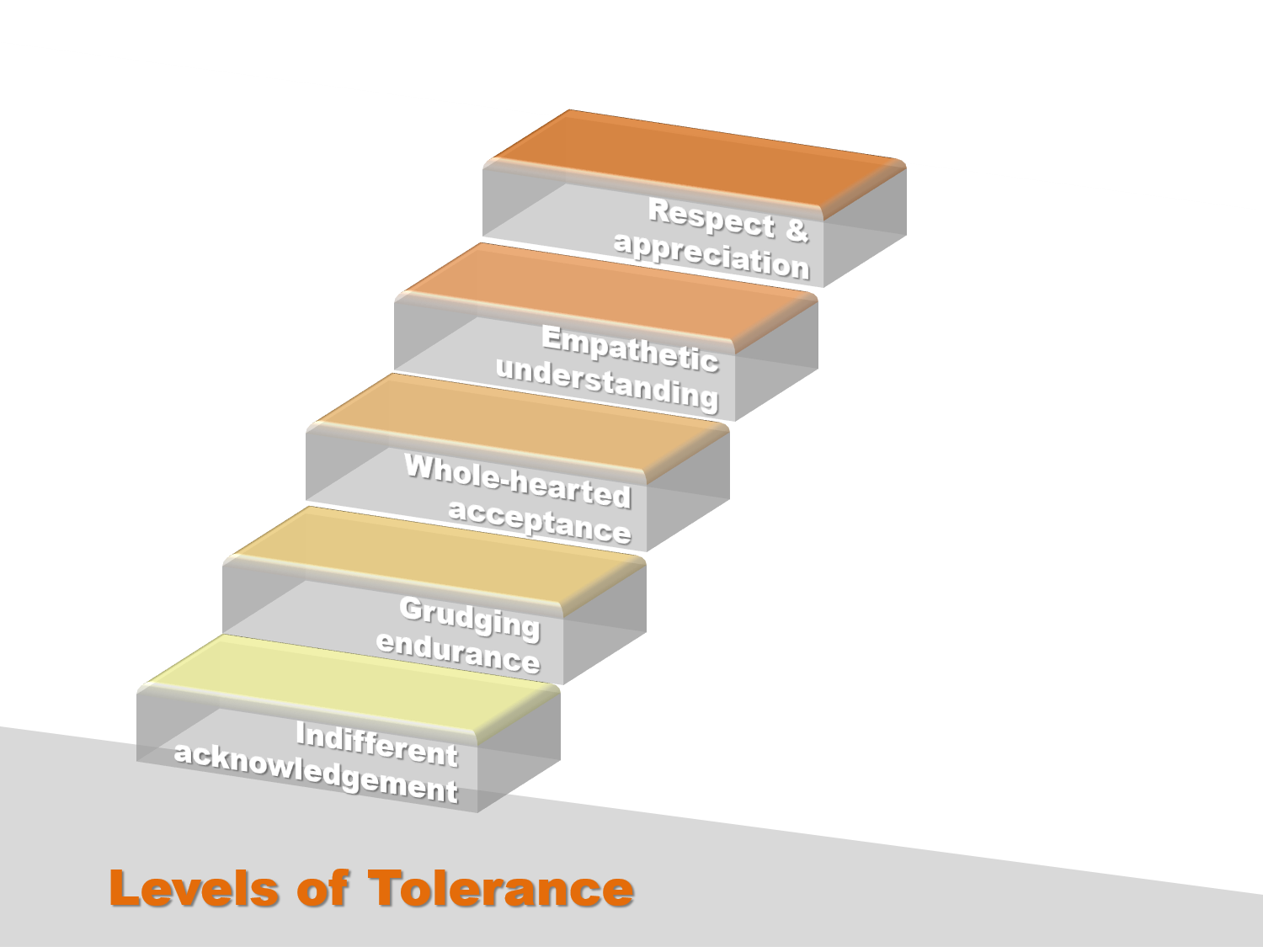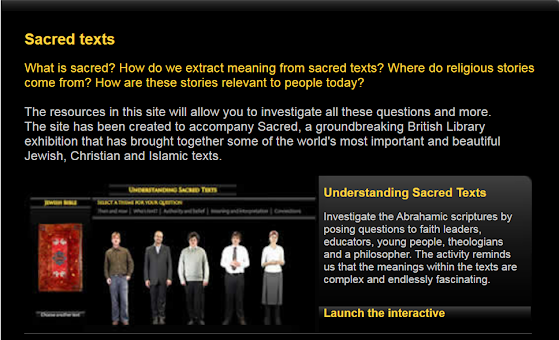Tolerance, Respect and Appreciation
Tolerance is not enough. I would say it is a neutral
"live and let live" attitude. It neither supports nor acts to prevent
what others say or do or how others live (so long as it does not impact
negatively on the life of others). It is certainly better than intolerance that
can lead to worse things - hateful words and violent actions. But better than
tolerance is respect for differences; and better than that is appreciation for
the richness that diversity can bring to our own being.
Respect the rights of people, even when we disagree with
their beliefs and actions. That seems like a good description of tolerance (as
a positive thing): tolerate (the existence of) the beliefs and practices while
respecting the right of others to hold them. A neutral position: no need to
support those beliefs and actions we disagree with but we don't try to block
them either = tolerance.
Not all religious
practices affect others. Those we can tolerate. But I agree, they can become
problematic when they affect others negatively. Finding the right word is not
as important as determining where to draw the line with tolerance and how to
respond when that line is crossed.
I believe in religious tolerance. Does that mean I should
stand by and do nothing when other people exhibit intolerance for something
they believe is wrong? Do we need to tolerate intolerant speech (right to free
speech, right to protest) but can step in when it goes beyond speech to action?
Is hate speech OK to tolerate, or is that beyond the line? Would acts of
protest be OK if they were not violent such as a peaceful march on the public
sidewalk in front of an abortion clinic, or a "sit-in", refusal to
move or work - passively getting in the way of the people or actions being
protested?
Tolerance and intolerance are attitudes. Actions may be based on such an attitude. But do
tolerant people need to tolerate intolerant people and intolerant beliefs so
long as those people do not hurt others? Hurt by speech as well as action (is
intolerant speech not free?), or only hurt by actions? There is this range of
attitudes where tolerance is the least of the best attitudes. Sometimes
tolerance is the most we can expect. And that is enough - for the time being -
because it is a place to start in building more positive relations over time.
A friend wonders "why people think that a disagreement
of opinion is somehow intolerance of that opinion?" He has a good point
there. But I do not think all
disagreements are a reflection of intolerance ("agree to disagree"
for instance). I suppose disagreement only becomes intolerance when we then
usurp a person's right to disagree or
to hold a different opinion. When we try to drown out their opinion with our
own rather than allow equal free speech.
Though when it comes to acting
on a different opinion, if that action
would impact negatively on another - that may be where "intolerance"
can and should step in.
And when disagreement
is expressed through name calling or other unnecessary rude or offensive
(almost said "childish") use of language - that is just not conducive
to any fruitful debate or discussion... It is such use of language, not the
disagreement itself that reflects and may deserve intolerance.
Tolerance and respect are good. But you don't tolerate intolerance and you don't respect
disrespect. Be it from religious extremists or from hard core anti-religion
atheists. So, at a certain point, I will admit that religious ecumenists are
hypocrites when it comes to where we draw the line. However, that line is not
on issues of belief (as it is with religious extremists and atheists), it is at
the level of attitude toward the
"other".
Are we tolerant people blind to our own intolerance? Blind
to how we come off to others who don't agree with our views? Sometimes it is
not clear just which side of a debate is being intolerant. Sometimes both sides
are intolerant. Take the 2017 incident in Charlottesville, VA: which side was
being intolerant, the folks protesting the removal of the Confederate statue or
the folks protesting against the protesters? It is OK to be intolerant of
intolerance (double negative = positive). But before we label, draw the line
and define tolerance vs intolerance, both sides might do better to dialogue with each other and seek to understand the perspective of the other. It helps to respect where others are
coming from when you hear the reasons behind their views.
Tolerance is a starting
point from which mutual respect and ultimately appreciation for differences can
grow. But just because a given person or group focuses explicitly on tolerance
does not mean that going beyond tolerance is not implied. It is necessary to
first preach tolerance in order to reach the countless folks who do not even go
that far. Many will and do in fact go beyond mere tolerance. Following on TOLERANCE as stage 1, ACCEPTANCE (accepting the existence of...) as stage 2, I would extend this to stage 3 being RESPECT and finally stage 4 being APPRECIATION.
I do prefer the terms respect and even appreciation. Tolerance
is not enough. We need to be able to see things from the other person's
perspective, walk in their shoes, have some empathy. Respect demonstrates LOVE.
Appreciation helps us to grow, to expand
our own perspective.
Even though we may not personally agree with the beliefs or
practices of others, I do believe it is important to try to understand and
respect it. We would want no less from them - mutual respect, despite our
differences. This is important if we are to live peacefully side-by-side in the
same society. This is what pluralism is all about. If others do not respect us,
we should still try to respect them. In so doing, we model the kind of behavior
we value. Perhaps, in time, it will make an impression and soften the other.
For me, appreciation means valuing religious diversity and even going so far as to value specific beliefs and even practices found in other religions. Perhaps one will value these because they are similar to beliefs or practices in one's own religion. But it may also be that appreciation can stem from other beliefs or practices being a complement or extension that can expand on one's own beliefs or practices. Meditation as taught in Buddhism is a good example of how a Christian or Jew can appreciate and value something from another religion that can easily be added to their own spiritual practices.
For me, appreciation means valuing religious diversity and even going so far as to value specific beliefs and even practices found in other religions. Perhaps one will value these because they are similar to beliefs or practices in one's own religion. But it may also be that appreciation can stem from other beliefs or practices being a complement or extension that can expand on one's own beliefs or practices. Meditation as taught in Buddhism is a good example of how a Christian or Jew can appreciate and value something from another religion that can easily be added to their own spiritual practices.
I do not really care if my students forget half of what they
learn. That they leave my class with an increased tolerance, respect and
appreciation for beliefs and practices that may differ from their own... that
is more important because that is what can
be learned in a single semester! And that
is what will make the biggest difference in their lives and the lives of
everyone they encounter throughout the rest of their lives! And that attitude
will go a long way to allowing them to continue life-long learning about
religion in formal (more classes) and informal ways (dialogue with people of
various religions).
Often all it takes to be more open to a given group is to
have some direct contact with the followers - get to know them as real people.
Folks who hold a bias against a given group often do so based on limited and
superficial exposure as well as hearsay and misrepresentation from others who
hold a bias against them.
See also: Religious Intolerance: Causes and Solutions, some observations
See also: Religious Intolerance: Causes and Solutions, some observations



Comments
Post a Comment